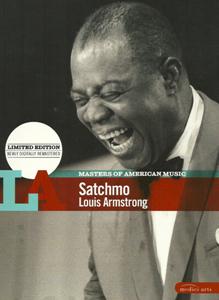1. Opening
2. A New Kind of Music
3. The Early Years
4. Achieving Stardom
5. Lady Armstrong
6. Ambassador Satch
7. A True revolutionary
8. Credits
This 1989 DVD achieves the virtually impossible task of compressing
Louis Armstrong's career into about 86 minutes. Its excellence is
probably due at least partly to jazz expert Gary Giddins, who wrote
and co-directed the film.
The DVD covers the life of a man whose childhood in New Orleans was
marked by poverty and a period in a waifs' home - as well as facing
for most of his life the indignities of racism which was then sadly
common in the USA. He overcame these problems with determination and
an almost unflagging good humour.
The DVD traces how the 65 recordings that Louis Armstrong (alias
"Satchmo") made with his Hot Five and Hot Seven changed the face of
jazz, because he front-lined the individual soloist who, before that
time, had been part of an ensemble rather than a star in his own right.
He also had a virtually unmatched technical expertise and the ability
to take daring liberties with rhythm. "Louis was very strong on rhythm",
says All Stars' clarinettist Joe Muranyi. This is exemplified by his
extraordinary introduction to West End Blues, which is usefully
shown on screen in musical notation as we hear Armstrong play it.
The story is illustrated throughout by well-chosen film footage,
which is remarkably clear and fresh. The early film clips include
Louis singing and playing Ain't Misbehavin' - as he did to
great acclaim in the 1929 Broadway show Hot Choclates. Satchmo
even appears in a Betty Boop cartoon singing I'll be Glad When
You're Dead, You Rascal You. Other film includes a lovely duet
between Armstrong and Jack Teagarden on Rockin' Chair and a
friendly trumpet battle with Dizzy Gillespie. And film of him playing
Sunny Side of the Street with his All Stars proves his astonishing
trumpet virtuosity.
We are reminded that Louis was almost as influential a singer as
a trumpeter. He popularised scatting - wordless vocalising - which
"Doc" Cheatham noted was a New Orleans tradition. And Tony Bennett
points out the Armstrong influence on such singers as Billie Holiday.
Armstrong's singing, together with his trumpet-playing, made him a
much-loved star performer throughout the world, becoming known as
"Ambassador Satch". Of course, in his later years he reached even
wider audiences through such hits as Hello Dolly and What
a Wonderful World.
Perhaps the best service that this DVD achieves is to set the record
straight about the false accusations of "Uncle Tom" levelled at Satchmo
in the 1950s. First of all, he outspokenly criticised President Eisenhower
for allowing the continued segregation in Southern schools. Armstrong's
success as a performer alongside such white entertainers as Bing Crosby
aided the acceptance of African-Americans. Milt Gabler remembers that
Louis refused to enter New York clubs where he had earlier experienced
racial intolerance ("He didn't want to feel the hurt again"). Lester
Bowie says in the film that Louis was "a true revolutionary" because
he effected change not by marching in the streets but simply by being
his generous, affable self, and developing jazz music as an art form.
Some of the interviewees are difficult to hear, and subtitles would
have been useful for such speakers as the slurring saxophonist Dexter
Gordon. Apart from this, the DVD is exemplary in telling the story
of one of the greatest exponents of what Tony Bennett calls "America's
classical music".
Tony Augarde
